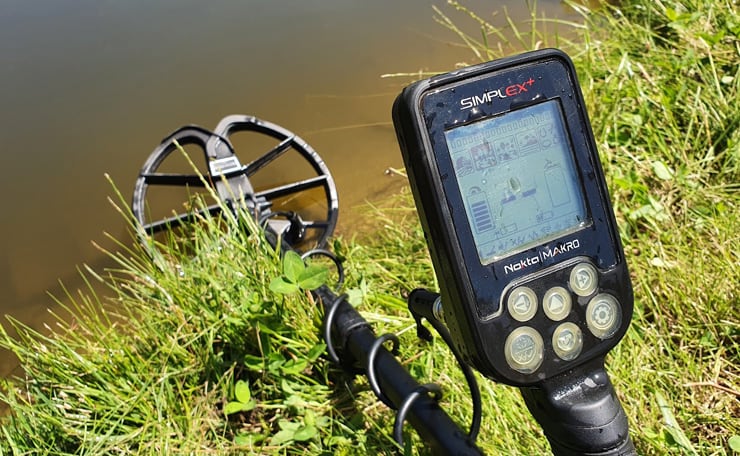Hezký díky za článek
Water detector up to 10.000 CZK
Categories: Detektory kovů Nokta - Makro Simplex

Since we are approaching the holiday season and searching in the water is so much in the news, we have made aa little special on what you can use for water searches and still stay under 10.000 CZK. It's just with a detector that everyone can kind of afford, but at the same time it's not a disposable device.
There are a number of sophisticated and more expensive water detectors. But I don't want to focus on those in this article. Thanks to Nokta, there are a couple of devices on the market that you can have fun with at the sea or pond and not only keep the limit of ten thousand, but you are also able to get under 8.In addition, with Simplex you can also get a nice look (field, meadow, forest) and Pulsedive will do a lot of work as a tracker.
Nokta-Makro Simplex+
The detector does not need any complicated introduction. After all, there is a great editorial test that everyone can read here: https://www.lovecpokladu.cz/home/redakcni-test-detektoru-kovu-nokta-simplex-7726
The detector is not bad and if we take into account the price, it comes out very well. But the main plus, which we want to highlight today, is the possibility to look in the water with the detector. For those who are interested in such a search and, of course, thanks to the summer weather, consider it much more than normal, here is a chance to get a device for 7.780 CZK fully submersible up to 3 meters! None of the reputable manufacturers have come up with anything like this yet.
Fresh and salt water
As with all detectors, it is one thing to walk in fresh water and another in salt water. Salinity is a bit of a problem for VLF detectors, sometimes more, sometimes less. In this respect, multifrequency technology is simply somewhere else. Still, the Simplex can do enough in beach mode to collect all the rings, euros a tad. Setting up the detector isn't difficult, and you can also see everything in the video
Setting up the detector to search in fresh water
Not much to go on here, the recommended mode is field. I wouldn't set the sensitivity to more than 5, but you may find yourself going up to 4. I recommend going without discrimination whenever possible. The rest of the settings are basically up to your preference (volume, etc).
Setting up the detector to search in salt water
Searching in salt water is a whole different story. Salinity does not do metal detectors any good and you need to adjust for that. In salt water you always need to select the beach mode. This will cause us a problem when searching for smaller gold targets (see iD video) and we need to move the discrimination to ID 15. The high salinity is related to the sensitivity setting. Low salinity (Black Sea, Baltic) will allow more than high salinity (Mediterranean). In the Mediterranean it will go to 3, which is fine, but always try to keep the detector as quiet as possible.
Video - How to use Simplex+ in the water
Detector website on LP
Simplex+ (base model)
Simplex+ PP set (set with tracker included)
Simplex+ WHP and Pointer (Set with wireless headset and tracker)
PulseDive Scuba Detector
Definitely the cheapest way to get a look in the water at the moment. The detector handles salinity very well, even high concentrations in the Mediterranean. Both myself and our kids spent hours in the water with it in Greece and Khrovatsk. The range is limited by both power and coil size, yet enough to keep you entertained for finding coins and rings while snorkeling.:)
Video - how to use the Scuba Detector
You can find all the settings and descriptions in the video.
PulseDive pages on LP
Nokta - Makro Pulsedive Pointer + Scuba Yellow SET (Set containing a tracking tip and a 14 cm diameter coil - yellow)
Nokta - Makro Pulsedive Pointer + Scuba Black SET (Set containing a tracking tip and a14 cm diameter coil - yellow)
Nokta - Makro PulseDive Scuba 20cm Black (Detector with probe 20 cm for greater coverage - black)
Nokta - Makro PulseDive Scuba 20cm Yellow (Detector with probe 20 cm for greater coverage - yellow)
The article is included in categories:
- Archive of articles > Metal Detectors - Reviews and Tests > Nokta - Reviews and tests > Detektory kovů Nokta - Makro Simplex
Post
Díky, a palec nahoru za Noktu - je fakt zábavný detektor.
Elmara: Můžu se zeptat jaký je opravdu reálný rozdíl, jak hloubkově, tak separačně, malá cívka Scuba oproti velké na Noktě? Díky. Jde mi o to, zda to má smysl brát pro dohledávky místo dohledávačky. Zda je to posun.
Rozdíl je velký i když započítám salinitu (která je pro vlf problém) , tak bude Detektor na více jak 3 násobku dosahu :)
to Elmara. Díky za odpověď. Ale teď to čtu a asi jsme se nepochopili..  Já myslel tu malo Scubu sondu versus velká Scuba sonda. Prostě rozdíl mezi těma dvouma Scuba sondama. 14cm vesrus 20cm. Díky.
Já myslel tu malo Scubu sondu versus velká Scuba sonda. Prostě rozdíl mezi těma dvouma Scuba sondama. 14cm vesrus 20cm. Díky.








